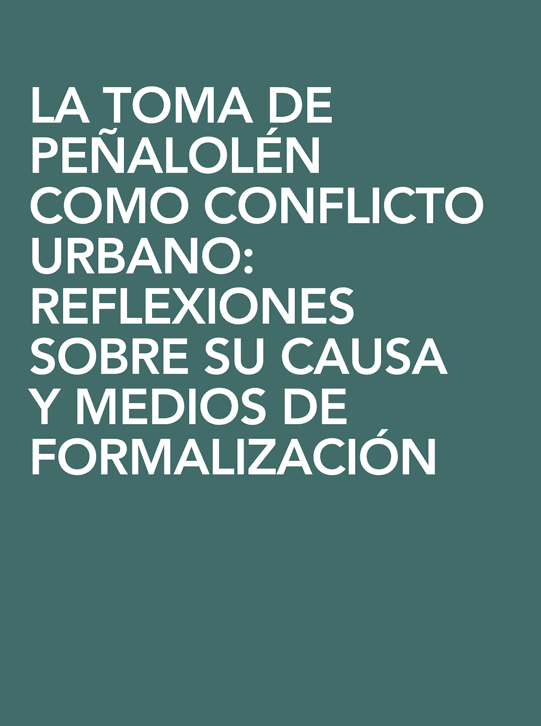La toma de Peñalolén como conflicto urbano: reflexiones sobre su causa y medios de formalización
Article Sidebar

Keywords:
Main Article Content
Abstract
Abstract
This article explores the meaning of ‘urban conflict’ from the perspective of a self-help settlement. It is understood that conflicts, like settlements, are multi-dimensional and multi-scale. Rather than perpetuating a notion of settlements as ‘conflict’ that certain places in the world suffer from (the global South), we chose to understand them as an expression of diversity, contributing to imagining and building an alternative part of the city (Robinson, 2006). Three dimensions will be emphasised: governance (Swyngedouw, 2011), sense of place (Harvey 2001), and planning (Roy, 2005; Friedmann, 2005). Some of the conclusions suggest reconsidering the planning that denies the existence of conflicts and tries to ‘solve’ the problem of settlements by any means. Settlements also impact on the way in which agreement to govern the city is shared, prioritized and obtained. Finally, places affect the nature of the conflict and its solution. As a case study, we will consider the Toma de Peñalolén (Occupation of Peñalolén), located in the western sector of Santiago de Chile. The results shown come from a recent research based on 35 interviews, a survey and secondary sources.
Article Details

This work is licensed under a Creative Commons Attribution-NonCommercial 4.0 International License.
Materia Arquitectura provides immediate and free access to all the content of this online edition, published simultaneously with the print edition.
Materia Arquitectura does not charge authors for any concept.
All contents of this electronic edition are distributed under the Creative Commons license of "Attribución-shareAlike 4.0 Internacional" (CC-BY-SA).
The rights of the published texts and images belong to their authors, who grant Materia Arquitectura the license for their use. The management of the permits and the authorization of the publication of the images (or of any material) that contains copyright and its consequent rights of reproduction in this publication is the sole responsibility of the authors of the articles.
As long as they mention their origin, the authors are free to distribute their articles by other means. Any total or partial reproduction of the material must mention its origin.
Downloads
References
ELGERT, L., & KRUEGER, R. (2012). Modernising sustainable development? Standardisation, evidence and experts in local indicators. Local Environment, 17(5), 561-571.
FRIEDMANN, J. (2005). Globalization and the emerging culture of planning. Progress in Planning, 64, 183-234.
FRÖSÉN, K. (2013). NGOs and Governmentality in Chile. The Case of TECHO and slum eradication programs. Obtenido de Lund University Libraries, LUP Student Papers: http://lup.lub.lu.se/student-papers/record/4003310
GIANNOTTI, E. (2014). Orígenes de un diseño participativo: la construcción de los barrios populares de Santiago. 1952-1973. Revista 180(34), 22-29.
GONZÁLEZ, C. (18 de mayo de 2015). Estudio muestra cómo ha cambiado el mapa social de Santiago. Recuperado el 10 de septiembre de 2015, de Diario La Tercera:
http://www.latercera.com/noticia/tendencias/2015/05/659-630172-9-estudio-muestra-como-ha-cambiado-el-mapa-social-de-santiago.shtml
HARVEY, D. (1996). Justice, Nature and the Geography of Difference. Cambridge, EE.UU.: Blackwell.
HARVEY, D. (2001). Spaces of Capital: Towards a Critical Geography. Nueva York, EE.UU.: Routledge.
LAGOS, R. (1999). Caminos de la igualdad. Tarjetón del candidato Ricardo Lagos para las elecciones presidenciales. Recuperado el 16 de septiembre de 2015, de Archivo Electoral:
http://www.archivoelectoral.org/imagenes/caminos-de-la-igualdad/679
LAPEYRE, F. (2013). Securing Livelihoods in Africa: Towards Multi-Scalar Policy Frameworks. European Journal of Development Research, 25(5), 659-679.
LEFEBVRE, H. (1996). The right to the city. En H. Lefebvre, E. Kofman (Ed.), & E. Lebas (Ed.), Writings on cities (págs. 147-159). Cambridge, EE.UU.: Wiley-Blackwell.
LUGO, M. A. (2005). Comparing Multidimensional Indices of Inequality: Methods and Application. Recuperado el 12 de septiembre de 2015, de Society for the Study of Economic Inequality: www.ecineq.org/milano/wp/ecineq2005-14.pdf
OCDE. (2013). Territorial Reviews: Antofagasta, Chile. París, Francia: OECD Publishing.
OZLER, I. (2012). The Concertación and Homelessness in Chile. Market-based Housing Policies and Limited Popular Participation. Latin American Perspectives, 39(4), 53-70.
PNUD. (1999). Índice de desarrollo humano en Chile 1990-1998. Número 3. Recuperado el 16 de septiembre de 2015, de Desarrollo Humano en Chile (PNUD):
http://desarrollohumano.cl/idh/download/todo.pdf
ROBINSON, J. (2006). Ordinary Cities: Between Modernity and Development. Londres, Inglaterra: Routledge.
Most read articles by the same author(s)
- Juan Pablo Astorga del Río, Self-help settlements as insights to urban conflicts: the case of Toma de Peñalolén in Santiago, Chile , Materia Arquitectura: No. 12 (2015): Materia Arquitectura 12 (Diciembre/December 2015)